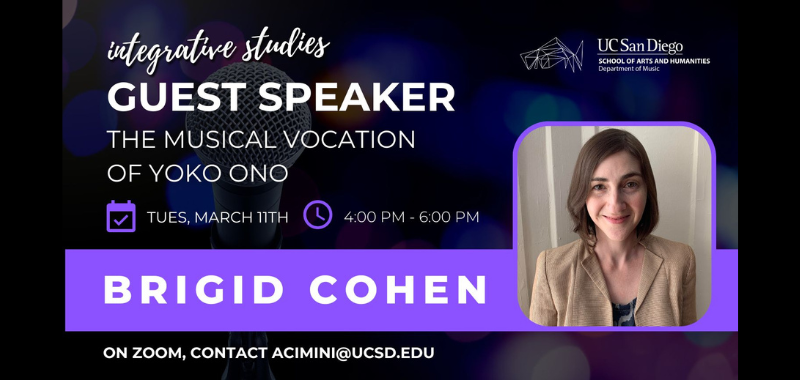Mar 11, 2025–Mar 11, 2025 from 4:00pm–6:00pm
Guest Speaker Brigid Cohen: The Musical Vocation of Yoko Ono

Contact acimini@ucsd.edu for more info
The Musical Vocation of Yoko Ono
From the beginning of her career, Yoko Ono enlisted musical terms to designate multimedia performances that audiences would not intuitively recognize as musical. She dubbed the far-out triptych of her 1961 Carnegie Recital Hall debut as a trio of “operas”—works that would eventually be seen as forerunners of the performance art movement. This work would lead to a fiercely experimental musical practice that scrambled genres from blues to kabuki to EDM across 22 albums over the course of nearly fifty years. Nonetheless remarkably little scholarship recognizes Ono’s musical thought and creativity as a cornerstone of her artistic vocation. In redress for this gap, I show how Ono’s early life would in fact have predisposed her to see music as a privileged space for working through vexed political and philosophical problems. Classically trained in piano and voice, Ono articulated a compelling desire to become a composer as an adolescent in World War II-era Japan. Drawing on archives, oral history, and close interpretation of Ono’s words, sounds, and actions, this talk rethinks the musical dimension of Ono’s artistic vocation—vocation as calling, as career, as persona, and as personal and political voice.
Brigid Cohen is a historical musicologist who specializes in the historiography of musics and musicians in migration. Her research and teaching examine the mass dislocation of peoples over the last two centuries, addressing conditions of empire, globalization, genocide, exile, and minoritized citizenship. This intellectual program stems from her conviction that music assumes special value under the pressure of conditions of uprooting. Music serves as a mode of self-fashioning, secures new (and old) community bonds, and brings individuals together in listening, speech, and action. It also interacts in variegated ways with the silences that emerge from troubled sites of memory.
Cohen has published extensively on the politics of 20th-century avant-gardes, archive theory, histories of cosmopolitanism, postcolonial studies, 20th-century German-Jewish diasporic thought, and intersections of music, literature, and the visual arts. Her most recent book, Musical Migration and Imperial New York: Early Cold War Scenes (University of Chicago Press, 2022), explores questions of displacement and citizenship through a study of New York concert avant-gardes, jazz, electronic music, and performance art in the 1950s and 1960s. This book trains its focus on the cultural-political dilemmas navigated by uprooted creators in New York as a capital of empire during the Cold War. The book addresses well-known but little understood figures (e.g., Charles Mingus, Yoko Ono, George Maciunas), alongside less well-known composers (e. g., Halim El-Dabh, Michiko Toyama, Vladimir Ussachevsky). Cohen’s emphasis on displacement began with her first book, Stefan Wolpe and the Avant-Garde Diaspora (Cambridge University Press, 2012). This book is both a study of the German-Jewish émigré composer Stefan Wolpe (1902-1972) and a history of modernism that focuses on experiences of migration and cross-cultural encounter— from the Bauhaus to Black Mountain College. The monograph won the Lewis Lockwood Prize of the American Musicological Society for best monograph of the year by a scholar at an early career stage.
In Fall 2023, Cohen was a visiting scholar at the Humboldt University in Berlin where she engaged in the early stages of writing two new monographs. The first, a short book manuscript, “The Musical Vocation of Yoko Ono,” which offers musically, conceptually, and historically textured account of Yoko Ono’s self-identified vocation as a composer—an identity that others often refused to acknowledge because of racial and gender bias. This manuscript expands upon themes and historical research from Cohen’s existing writings on Ono. Her other book project, “Salon, Varieté, Archive: Sounding Empire in Berlin, 1820-1933,” offers a historiography of German music beyond the homogenizing idea of culture, or Kulturnation, through which is has often been defined. Toward that end, it focuses on three underexplored musical spaces as sites for thinking through processes of Orientalism, imperialism, migration, and hierarchies of citizenship. This book will examine musical salons, varieté theater, and phonogram archives as intercultural sites vital for the imagination of Germany’s “others” on its path to empire (and eventually totalitarianism) from the 19th century onward.
In addition to having published numerous articles, Cohen was the convener of the round table “Edward Said and Musicology Today” in Journal of the Royal Musical Association (2016). In recent years, her research has been supported by the Max Planck Institute for History of Science (2017, 2018), the National Endowment for the Humanities (2014-15), Wellesley College (2014-15), and the American Academy in Berlin (2010).
Date and Time
Mar 11, 2025–Mar 11, 2025
from 4:00pm–6:00pm
Location
ON ZOOM
Event Registration
Registration is not required for this event.
Event Fee
FREE
Contact
Amy Cimini • acimini@ucsd.edu
Audience
Faculty, Staff, Students, The General Public, Alumni
Event Host
UC San Diego Department of Music